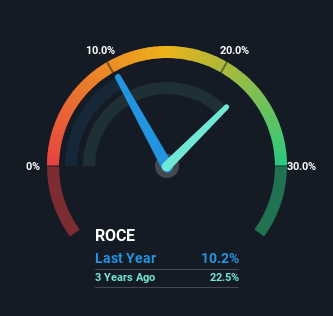The Returns On Capital At Yenher Holdings Berhad (KLSE:YENHER) Don't Inspire Confidence

If we want to find a stock that could multiply over the long term, what are the underlying trends we should look for? Amongst other things, we'll want to see two things; firstly, a growing return on capital employed (ROCE) and secondly, an expansion in the company's amount of capital employed. If you see this, it typically means it's a company with a great business model and plenty of profitable reinvestment opportunities. Having said that, from a first glance at Yenher Holdings Berhad (KLSE:YENHER) we aren't jumping out of our chairs at how returns are trending, but let's have a deeper look.
Understanding Return On Capital Employed (ROCE)
Just to clarify if you're unsure, ROCE is a metric for evaluating how much pre-tax income (in percentage terms) a company earns on the capital invested in its business. The formula for this calculation on Yenher Holdings Berhad is:
Return on Capital Employed = Earnings Before Interest and Tax (EBIT) ÷ (Total Assets - Current Liabilities)
0.10 = RM25m ÷ (RM264m - RM19m) (Based on the trailing twelve months to June 2024).
Therefore, Yenher Holdings Berhad has an ROCE of 10%. That's a relatively normal return on capital, and it's around the 8.9% generated by the Food industry.
View our latest analysis for Yenher Holdings Berhad

In the above chart we have measured Yenher Holdings Berhad's prior ROCE against its prior performance, but the future is arguably more important. If you're interested, you can view the analysts predictions in our free analyst report for Yenher Holdings Berhad .
How Are Returns Trending?
On the surface, the trend of ROCE at Yenher Holdings Berhad doesn't inspire confidence. To be more specific, ROCE has fallen from 26% over the last five years. And considering revenue has dropped while employing more capital, we'd be cautious. If this were to continue, you might be looking at a company that is trying to reinvest for growth but is actually losing market share since sales haven't increased.
On a side note, Yenher Holdings Berhad has done well to pay down its current liabilities to 7.1% of total assets. That could partly explain why the ROCE has dropped. What's more, this can reduce some aspects of risk to the business because now the company's suppliers or short-term creditors are funding less of its operations. Since the business is basically funding more of its operations with it's own money, you could argue this has made the business less efficient at generating ROCE.
The Key Takeaway
From the above analysis, we find it rather worrisome that returns on capital and sales for Yenher Holdings Berhad have fallen, meanwhile the business is employing more capital than it was five years ago. Despite the concerning underlying trends, the stock has actually gained 20% over the last three years, so it might be that the investors are expecting the trends to reverse. Either way, we aren't huge fans of the current trends and so with that we think you might find better investments elsewhere.
If you'd like to know about the risks facing Yenher Holdings Berhad, we've discovered 2 warning signs that you should be aware of.
If you want to search for solid companies with great earnings, check out this free list of companies with good balance sheets and impressive returns on equity.
New: Manage All Your Stock Portfolios in One Place
We've created the ultimate portfolio companion for stock investors, and it's free.
• Connect an unlimited number of Portfolios and see your total in one currency
• Be alerted to new Warning Signs or Risks via email or mobile
• Track the Fair Value of your stocks
Have feedback on this article? Concerned about the content? Get in touch with us directly. Alternatively, email editorial-team (at) simplywallst.com.
This article by Simply Wall St is general in nature. We provide commentary based on historical data and analyst forecasts only using an unbiased methodology and our articles are not intended to be financial advice. It does not constitute a recommendation to buy or sell any stock, and does not take account of your objectives, or your financial situation. We aim to bring you long-term focused analysis driven by fundamental data. Note that our analysis may not factor in the latest price-sensitive company announcements or qualitative material. Simply Wall St has no position in any stocks mentioned.
About KLSE:YENHER
Yenher Holdings Berhad
An investment holding company, engages in manufacturing, suppling, and marketing of animal health and nutrition products for livestock and companion animals in Malaysia and internationally.
Flawless balance sheet with moderate growth potential.
Similar Companies
Market Insights
Community Narratives



